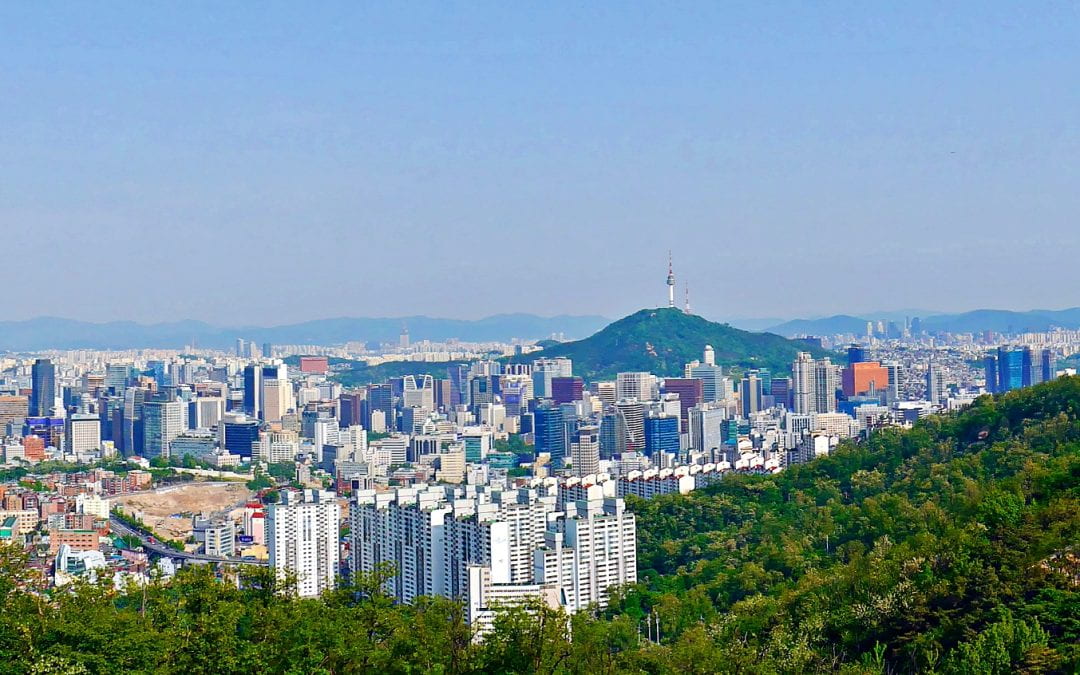Thursday (Day 12): Today was another solo day for me: I had 2 interviews scheduled with psychologists at Adaptable Human Solutions (AHS), a private counseling center in Seoul. I took the subway in the morning to get to the center and was surprised to find that it was on the 25th floor of a Lotte Castle, which is a type of luxury building that houses residential apartments and businesses. I couldn’t help but compare the location of this counseling center to the ones that I had seen in my other countries. When I entered AHS, there were floor to ceiling glass windows in the waiting area that offered stunning views of the city, and there was even a beverage menu for guests to select from. For some reason, it didn’t feel like I was coming to receive a healthcare service. Rather, it felt like I was waiting to take part of a treatment far more elite. I’m not sure if this makes sense, but physically being in this space felt like a very different experience than the other on-site locations that I’ve been able to conduct interviews in.
My first interview was with an associate clinical psychologist. Interestingly, she received her license to practice therapy from Illinois. AHS offers therapy in both English and Korean, so my interviewee and I were able to have a conversation in English (which is easier for me when discussing psychological topics, even though I am generally fluent in Korean). She informed me that there are no strict regulations in Korea for practicing therapy. In other words, you can obtain a license from any other country and that license will be valid here without the need for further training or education.
We also talked about how the high suicide rate in South Korea was a reason for why she decided to come work here. But when we discussed the intake process at AHS, she mentioned how high risk clients are not accepted at the center. Instead, these clients are referred to psychiatrists and encouraged to go to major hospitals. This was interesting because our interview gave me the impression that therapy and mental healthcare are genuinely two distinct entities in Korea. I hope to better understand this phenomenon as I continue to review my research data.
My second interview was with a clinical psychologist at AHS who is a foreigner. She obtained her license and her doctorate degree from Scotland, and she decided to practice therapy in Korea because she liked the atmosphere of Seoul and wanted to live here. It was interesting to hear about the mental health landscape in South Korea from the lens of a foreign professional. She discussed comparisons that she couldn’t help but notice between Scotland and Korea when it came to the abundance of therapy centers or mental health advertisements.
Following my interviews, I caught up on some work at a nearby cafe!
Friday (Day 13): I had another interview scheduled today at Adaptable Human Solutions. This time I met with a clinical psychologist who had worked in the mental health field in South Korea for decades; she previously worked as a mental health professor at Ewha Women’s University as well as Yonsei University. Compared to the interviews that I had yesterday, today’s interviewee was able to provide me with a more native Korean perspective of trauma and therapy in this country.
Like Professor Seo, she also discussed systemic issues regarding therapy in Korea. For example, not only is any international therapy license considered valid in Korea, there is no licensing requirement at all. This means that anybody can open up a counseling or therapy center as long as they register that center with the government – this process functions the same as when setting up a new business. The only people that are licensed are psychologists that work with children, but even this license is very limited in what it allows psychologists to do. Because most psychologists are thus unlicensed, when unfathomable tragedies (such as the Sewol Ferry incident or the Itaewon incident) occur in the country, the ones that are providing emergency mental health services to the Korean population are not psychologists or therapists; they are mostly nurses and other healthcare professionals. These people usually do not have the training to appropriately care for traumatized individuals, so often, they will say the wrong thing that ends up negatively impacting the mental health of someone who is already suffering.
Fortunately, she informed me that a licensing process is currently being established in Korea by the national government. She hopes that this change will provide psychologists and therapists with a greater role in the healthcare system as well as help to remove some of the misunderstandings and stigma surrounding therapy.
Even though a lot of my interviews in Korea have highlighted issues rather than positive points in the country’s mental health scene, I am not disheartened by these conversations. Instead, I find it inspiring that professionals in the field are not afraid to acknowledge and criticize limitations and that the country, on a government level, is actively trying to change the system!
Thanks for reading 🖤

